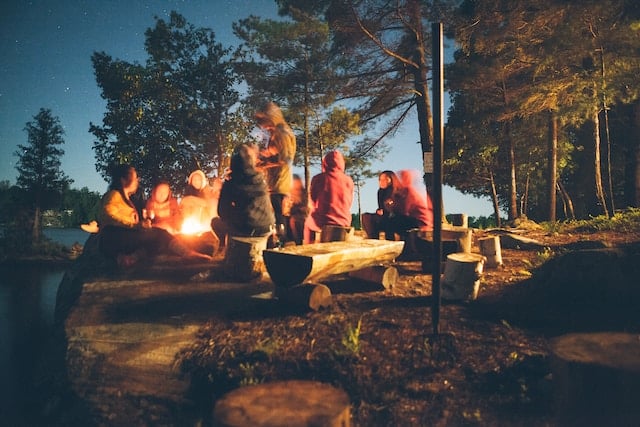As a nation of nature-lovers, Britons hold a deep respect for the great outdoors. This is particularly true when it comes to camping – a pastime that allows us to immerse ourselves fully in the wild. Yet, along with the joy of camping comes the responsibility of leaving no trace behind, particularly in the realm of waste disposal. As you prepare for your next camping trip, you might be wondering: what are the best practices for disposing of waste while camping in the UK? In this article, we’ll delve into this topic, covering everything from rubbish and recycling to water and toilet waste.
The Importance of Leave No Trace
Leave No Trace is a global outdoor ethics movement that promotes responsible outdoor recreation. It’s based on seven principles, one of which is ‘Dispose of Waste Properly.’ This principle is crucial in maintaining the natural beauty and health of our campsites and the wider environment.
A voir aussi : Discover the ultimate kauai rooftop camping experience
By now, the phrase ‘take only pictures, leave only footprints’ might sound like a tired cliché, but it truly encapsulates the essence of this principle. It doesn’t just apply to obvious rubbish like paper, cans, and bottles, but also to food scraps, toilet waste, and even soapy water from washing up. All these can harm wildlife and degrade natural habitats if not handled correctly. So, how exactly should you go about disposing of these different types of waste?
Rubbish and Recycling Disposal
When it comes to rubbish disposal, the rule is simple: pack it in, pack it out. This means whatever you bring into a campsite, you should also carry out. That includes all your rubbish, from food wrappers to broken tent pegs. To make this easier, bring several rubbish and recycling bags with you.
Dans le meme genre : How to find campsites with excellent views of the UK countryside?
Remember that recycling facilities can be scarce in more remote camping locations. You might be used to recycling at home, but don’t assume you’ll find recycling bins at your campsite. Plan to take recyclables home with you for proper disposal.
As for food waste, you might think that because it’s biodegradable, it’s okay to leave it behind. However, this is not the case. Discarded food can attract unwanted wildlife to your campsite, leading to dangerous encounters. It can also disrupt the local ecosystem. Therefore, all food scraps should go in your rubbish bag.
Water Waste Disposal
Water waste management might not immediately spring to mind when you think of camping, but it’s a significant aspect of Leave No Trace. When you’re camping, you’ll generate grey water from activities like cooking and washing dishes. This water can contain food particles, bits of soap, and other contaminants that are harmful to wildlife and water sources.
To minimise the impact of your grey water, try to reduce the amount you generate in the first place. Use minimal water for cooking and washing, and use biodegradable, phosphate-free soap. When it’s time to dispose of your grey water, don’t pour it directly into a water source. Instead, scatter it over a wide area at least 70 steps (about 200 feet) away from water sources, campsites, and trails.
Toilet Waste Disposal
Disposing of toilet waste properly is one of the most important things you can do to protect the outdoors. Human waste can contaminate water sources and spread disease, not to mention it’s unpleasant to come across in the wild.
If there are no toilet facilities at your campsite, you’ll need to dig a cathole. This should be at least 15-20 centimetres deep and located at least 70 steps away from water sources, campsites, and trails. After use, cover the cathole with the original soil and disguise it with natural materials.
Note that toilet paper should be packed out in a sealed bag, as it can take a long time to decompose. Alternatively, you can use natural materials like leaves or smooth stones, just make sure to bury these in your cathole. Certain areas in the UK also require you to pack out solid human waste. If you’re camping in one of these areas, you’ll need to bring waste disposal bags with you.
Campfire Waste Disposal
Finally, let’s talk about campfire waste. A campfire can leave a significant trace if not handled properly. To begin with, only light fires where they are permitted, and use established fire rings if they’re available.
When you’re done with your fire, make sure it’s completely out before you leave. You should be able to touch the ashes without getting burned. Scatter the cool ashes over a wide area away from your campsite. Don’t leave any trash in the fire ring. Even if you burn it, small pieces of foil and glass can remain, which are harmful to wildlife.
In conclusion, disposing of waste properly while camping is crucial for preserving the outdoors for future generations. By following the best practices outlined in this article, you can ensure you leave no trace on your next camping trip.
Eco-Friendly Practices for Wild Camping in the UK
When venturing beyond managed campsites and into the world of wild camping, the principles of Leave No Trace become even more critical. Wild camping puts you in direct contact with the fragile natural environment, and its remote nature means that waste management facilities are often non-existent. Therefore, it is crucial to remember best practices for waste disposal, whether it’s general rubbish, toilet waste or grey water.
In the absence of waste collection services, you should always pack out what you pack in. This applies not only to general waste like food scraps and wrappers, but also to toilet paper. Although it might seem inconvenient, carrying used toilet paper out in a sealed bag and disposing of it at home is a significantly better alternative to leaving it in the wild, where it can take a long time to decompose and disturb the natural habitat.
When wild camping, you need to be resourceful with fresh water, as it may be limited. Remember to use minimal water for cooking and washing dishes, and always opt for eco-friendly, phosphate-free soap. When it comes to getting rid of grey water, scatter it over a large area, keeping at least 70 steps away from water sources, campsites and trails. The aim here is to avoid contamination and protect the environment as much as possible.
If you need to go to the toilet outdoors during your wild camping trip, remember to dig a cathole at least 15-20 centimetres deep and cover it up afterwards. However, in some areas in the UK, you are required to bring your own waste disposal bags for solid human waste. Before you set off, make sure to check the specific guidelines for the location you will be camping in.
Conclusion: Balancing Enjoyment and Responsibility
Enjoying the great outdoors is a privilege, but it also comes with the responsibility to preserve these wild, beautiful places for future generations. A camping trip opens a window to nature’s wonders, but it also poses a potential threat to the environment if waste is not managed properly.
Whether you’re embarking on an adventure in a managed campsite or trying your hand at wild camping, remember to always abide by the principles of the Leave No Trace movement. This involves packing out what you pack in, using fresh water sparingly, and disposing of grey water and toilet waste responsibly.
While some practices may be inconvenient, such as carrying used toilet paper out or scattering grey water over a large area, they are small actions that go a long way in preserving the natural environment. Keep in mind that the overall goal is not just to enjoy our camping trip, but also to ensure that we are not leaving any negative impact on the places we visit.
So on your next camping adventure, remember to take only pictures, leave only footprints, and follow the best practices for waste disposal. That way, you’ll do your part in ensuring that the beauty of the UK’s wild camping spots remains unspoiled for years to come.











